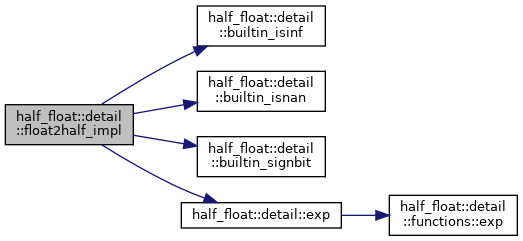Implementation details. More...
Classes | |
| struct | binary_specialized |
| Wrapper for binary half-precision functions needing specialization for individual argument types. More... | |
| struct | binary_specialized< half, half > |
| struct | binary_t |
| Tag type for binary construction. More... | |
| struct | bits |
| Type traits for floating point bits. More... | |
| struct | bits< const T > |
| struct | bits< const volatile T > |
| struct | bits< double > |
| Unsigned integer of (at least) 64 bits width. More... | |
| struct | bits< float > |
| Unsigned integer of (at least) 32 bits width. More... | |
| struct | bits< volatile T > |
| struct | bool_type |
| Helper for tag dispatching. More... | |
| struct | conditional |
| Conditional type. More... | |
| struct | conditional< false, T, F > |
| struct | enable |
| SFINAE helper for generic half-precision functions. More... | |
| struct | enable< T, expr, expr, expr > |
| struct | enable< T, expr, expr, half > |
| struct | enable< T, expr, expr, void > |
| struct | enable< T, expr, half, expr > |
| struct | enable< T, expr, half, half > |
| struct | enable< T, expr, half, void > |
| struct | enable< T, expr, void, void > |
| struct | enable< T, half, expr, expr > |
| struct | enable< T, half, expr, half > |
| struct | enable< T, half, expr, void > |
| struct | enable< T, half, half, expr > |
| struct | enable< T, half, half, half > |
| struct | enable< T, half, half, void > |
| struct | enable< T, half, void, void > |
| struct | expr |
| Temporary half-precision expression. More... | |
| struct | functions |
| Wrapper implementing unspecialized half-precision functions. More... | |
| struct | half_caster |
| Helper class for half casts. More... | |
| struct | half_caster< half, expr, R > |
| struct | half_caster< half, half, R > |
| struct | half_caster< half, U, R > |
| struct | half_caster< T, expr, R > |
| struct | half_caster< T, half, R > |
| struct | is_float |
| Type traits for floating point types. More... | |
| struct | is_float< const T > |
| struct | is_float< const volatile T > |
| struct | is_float< double > |
| struct | is_float< float > |
| struct | is_float< long double > |
| struct | is_float< volatile T > |
| struct | result |
| Return type for specialized generic 2-argument half-precision functions. More... | |
| struct | result< half, half > |
| struct | unary_specialized |
| Wrapper for unary half-precision functions needing specialization for individual argument types. More... | |
| struct | unary_specialized< expr > |
Typedefs | |
| typedef bool_type< true > | true_type |
| typedef bool_type< false > | false_type |
| typedef unsigned short | uint16 |
| Unsigned integer of (at least) 16 bits width. More... | |
Variables | |
| const binary_t | binary = binary_t() |
| Tag for binary construction. More... | |
Conversion | |
| template<std::float_round_style R> | |
| uint16 | float2half_impl (float value, true_type) |
| Convert IEEE single-precision to half-precision. More... | |
| template<std::float_round_style R> | |
| uint16 | float2half_impl (double value, true_type) |
| Convert IEEE double-precision to half-precision. More... | |
| template<std::float_round_style R, typename T > | |
| uint16 | float2half_impl (T value, false_type) |
| Convert non-IEEE floating point to half-precision. More... | |
| template<std::float_round_style R, typename T > | |
| uint16 | float2half (T value) |
| Convert floating point to half-precision. More... | |
| template<std::float_round_style R, bool S, typename T > | |
| uint16 | int2half_impl (T value) |
| Convert integer to half-precision floating point. More... | |
| template<std::float_round_style R, typename T > | |
| uint16 | int2half (T value) |
| Convert integer to half-precision floating point. More... | |
| float | half2float_impl (uint16 value, float, true_type) |
| Convert half-precision to IEEE single-precision. More... | |
| double | half2float_impl (uint16 value, double, true_type) |
| Convert half-precision to IEEE double-precision. More... | |
| template<typename T > | |
| T | half2float_impl (uint16 value, T,...) |
| Convert half-precision to non-IEEE floating point. More... | |
| template<typename T > | |
| T | half2float (uint16 value) |
| Convert half-precision to floating point. More... | |
| template<std::float_round_style R, bool E, typename T > | |
| T | half2int_impl (uint16 value) |
| Convert half-precision floating point to integer. More... | |
| template<std::float_round_style R, typename T > | |
| T | half2int (uint16 value) |
| Convert half-precision floating point to integer. More... | |
| template<typename T > | |
| T | half2int_up (uint16 value) |
| Convert half-precision floating point to integer using round-to-nearest-away-from-zero. More... | |
| template<std::float_round_style R, bool E> | |
| uint16 | round_half_impl (uint16 value) |
| Round half-precision number to nearest integer value. More... | |
| template<std::float_round_style R> | |
| uint16 | round_half (uint16 value) |
| Round half-precision number to nearest integer value. More... | |
| uint16 | round_half_up (uint16 value) |
| Round half-precision number to nearest integer value using round-to-nearest-away-from-zero. More... | |
| template<std::float_round_style R, typename T > | |
| uint16 | float2half_impl (T value,...) |
| Convert non-IEEE floating point to half-precision. More... | |
Implementation details.
| typedef bool_type< true > half_float::detail::true_type |
| typedef bool_type< false > half_float::detail::false_type |
| typedef unsigned short half_float::detail::uint16 |
Unsigned integer of (at least) 16 bits width.
| bool half_float::detail::builtin_isinf | ( | T | arg | ) |
Check for infinity.
| T | argument type (builtin floating point type) |
| arg | value to query |
| true | if infinity |
| false | else |
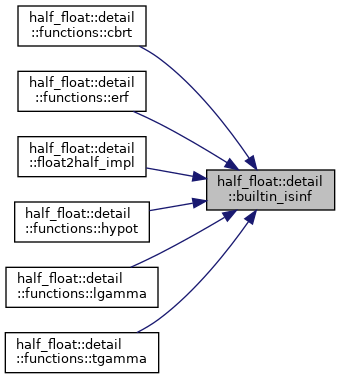
| bool half_float::detail::builtin_isnan | ( | T | arg | ) |
Check for NaN.
| T | argument type (builtin floating point type) |
| arg | value to query |
| true | if not a number |
| false | else |
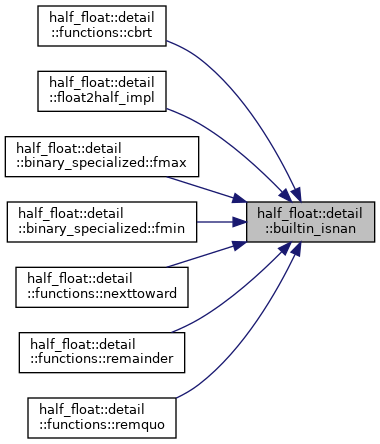
| bool half_float::detail::builtin_signbit | ( | T | arg | ) |
Check sign.
| T | argument type (builtin floating point type) |
| arg | value to query |
| true | if signbit set |
| false | else |
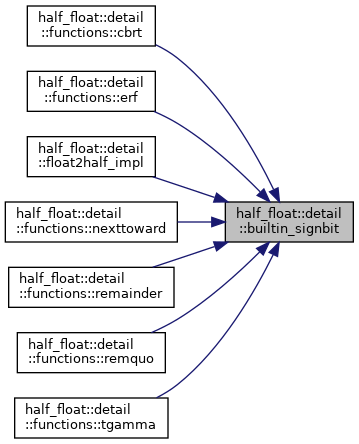
| uint16 half_float::detail::float2half_impl | ( | float | value, |
| true_type | |||
| ) |
Convert IEEE single-precision to half-precision.
Credit for this goes to Jeroen van der Zijp.
| R | rounding mode to use, std::round_indeterminate for fastest rounding |
| value | single-precision value |
| uint16 half_float::detail::float2half_impl | ( | double | value, |
| true_type | |||
| ) |
Convert IEEE double-precision to half-precision.
| R | rounding mode to use, std::round_indeterminate for fastest rounding |
| value | double-precision value |

| uint16 half_float::detail::float2half_impl | ( | T | value, |
| false_type | |||
| ) |
Convert non-IEEE floating point to half-precision.
| R | rounding mode to use, std::round_indeterminate for fastest rounding |
| T | source type (builtin floating point type) |
| value | floating point value |
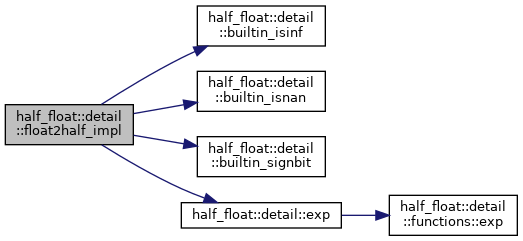
| uint16 half_float::detail::float2half | ( | T | value | ) |
Convert floating point to half-precision.
| R | rounding mode to use, std::round_indeterminate for fastest rounding |
| T | source type (builtin floating point type) |
| value | floating point value |
| uint16 half_float::detail::int2half_impl | ( | T | value | ) |
Convert integer to half-precision floating point.
| R | rounding mode to use, std::round_indeterminate for fastest rounding |
| S | true if value negative, false else |
| T | type to convert (builtin integer type) |
| value | non-negative integral value |

| uint16 half_float::detail::int2half | ( | T | value | ) |
Convert integer to half-precision floating point.
| R | rounding mode to use, std::round_indeterminate for fastest rounding |
| T | type to convert (builtin integer type) |
| value | integral value |
Convert half-precision to IEEE single-precision.
Credit for this goes to Jeroen van der Zijp.
| value | binary representation of half-precision value |

Convert half-precision to IEEE double-precision.
| value | binary representation of half-precision value |

| T half_float::detail::half2float_impl | ( | uint16 | value, |
| T | , | ||
| ... | |||
| ) |
Convert half-precision to non-IEEE floating point.
| T | type to convert to (builtin integer type) |
| value | binary representation of half-precision value |

| T half_float::detail::half2float | ( | uint16 | value | ) |
Convert half-precision to floating point.
| T | type to convert to (builtin integer type) |
| value | binary representation of half-precision value |

| T half_float::detail::half2int_impl | ( | uint16 | value | ) |
Convert half-precision floating point to integer.
| R | rounding mode to use, std::round_indeterminate for fastest rounding |
| E | true for round to even, false for round away from zero |
| T | type to convert to (buitlin integer type with at least 16 bits precision, excluding any implicit sign bits) |
| value | binary representation of half-precision value |
| R | rounding mode to use, std::round_indeterminate for fastest rounding |
| E | true for round to even, false for round away from zero |
| T | type to convert to (buitlin integer type with at least 16 bits precision, excluding any implicit sign bits) |
| value | binary representation of half-precision value |
| T half_float::detail::half2int | ( | uint16 | value | ) |
Convert half-precision floating point to integer.
| R | rounding mode to use, std::round_indeterminate for fastest rounding |
| T | type to convert to (buitlin integer type with at least 16 bits precision, excluding any implicit sign bits) |
| value | binary representation of half-precision value |
| R | rounding mode to use, std::round_indeterminate for fastest rounding |
| T | type to convert to (buitlin integer type with at least 16 bits precision, excluding any implicit sign bits) |
| value | binary representation of half-precision value |
| T half_float::detail::half2int_up | ( | uint16 | value | ) |
Convert half-precision floating point to integer using round-to-nearest-away-from-zero.
| T | type to convert to (buitlin integer type with at least 16 bits precision, excluding any implicit sign bits) |
| value | binary representation of half-precision value |
| T | type to convert to (buitlin integer type with at least 16 bits precision, excluding any implicit sign bits) |
| value | binary representation of half-precision value |
| uint16 half_float::detail::round_half_impl | ( | uint16 | value | ) |
Round half-precision number to nearest integer value.
| R | rounding mode to use, std::round_indeterminate for fastest rounding |
| E | true for round to even, false for round away from zero |
| value | binary representation of half-precision value |
Round half-precision number to nearest integer value.
| R | rounding mode to use, std::round_indeterminate for fastest rounding |
| value | binary representation of half-precision value |
Round half-precision number to nearest integer value using round-to-nearest-away-from-zero.
| value | binary representation of half-precision value |

| enable< bool, T, U >::type half_float::detail::operator== | ( | T | x, |
| U | y | ||
| ) |
Comparison for equality.
| x | first operand |
| y | second operand |
| true | if operands equal |
| false | else |

| enable< bool, T, U >::type half_float::detail::operator!= | ( | T | x, |
| U | y | ||
| ) |
Comparison for inequality.
| x | first operand |
| y | second operand |
| true | if operands not equal |
| false | else |

| enable< bool, T, U >::type half_float::detail::operator< | ( | T | x, |
| U | y | ||
| ) |
Comparison for less than.
| x | first operand |
| y | second operand |
| true | if x less than y |
| false | else |

| enable< bool, T, U >::type half_float::detail::operator> | ( | T | x, |
| U | y | ||
| ) |
Comparison for greater than.
| x | first operand |
| y | second operand |
| true | if x greater than y |
| false | else |

| enable< bool, T, U >::type half_float::detail::operator<= | ( | T | x, |
| U | y | ||
| ) |
Comparison for less equal.
| x | first operand |
| y | second operand |
| true | if x less equal y |
| false | else |

| enable< bool, T, U >::type half_float::detail::operator>= | ( | T | x, |
| U | y | ||
| ) |
Comparison for greater equal.
| x | first operand |
| y | second operand |
| true | if x greater equal y |
| false | else |

| enable< expr, T, U >::type half_float::detail::operator+ | ( | T | x, |
| U | y | ||
| ) |
Add halfs.
| x | left operand |
| y | right operand |

| enable< expr, T, U >::type half_float::detail::operator- | ( | T | x, |
| U | y | ||
| ) |
Subtract halfs.
| x | left operand |
| y | right operand |

| enable< expr, T, U >::type half_float::detail::operator* | ( | T | x, |
| U | y | ||
| ) |
Multiply halfs.
| x | left operand |
| y | right operand |

| enable< expr, T, U >::type half_float::detail::operator/ | ( | T | x, |
| U | y | ||
| ) |
Divide halfs.
| x | left operand |
| y | right operand |

| enable< T, T >::type half_float::detail::operator+ | ( | T | arg | ) |
Identity.
| arg | operand |
| enable< T, T >::type half_float::detail::operator- | ( | T | arg | ) |
Negation.
| arg | operand |

| enable< std::basic_ostream< charT, traits > &, T >::type half_float::detail::operator<< | ( | std::basic_ostream< charT, traits > & | out, |
| T | arg | ||
| ) |
Output operator.
| out | output stream to write into |
| arg | half expression to write |

| std::basic_istream< charT, traits > & half_float::detail::operator>> | ( | std::basic_istream< charT, traits > & | in, |
| half & | arg | ||
| ) |
Input operator.
| in | input stream to read from |
| arg | half to read into |

Absolute value.
| arg | operand |

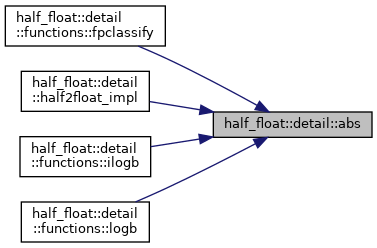
Absolute value.
| arg | operand |

Absolute value.
| arg | operand |


Absolute value.
| arg | operand |

Remainder of division.
| x | first operand |
| y | second operand |

Absolute value.
| arg | operand |

Absolute value.
| arg | operand |

Absolute value.
| arg | operand |

Remainder of division.
| x | first operand |
| y | second operand |

Absolute value.
| arg | operand |

Absolute value.
| arg | operand |

Absolute value.
| arg | operand |

Remainder of division.
| x | first operand |
| y | second operand |
| quo | address to store some bits of quotient at |

Absolute value.
| arg | operand |

Absolute value.
| arg | operand |

Absolute value.
| arg | operand |

Fused multiply add.
| x | first operand |
| y | second operand |
| z | third operand |

Absolute value.
| arg | operand |

Absolute value.
| arg | operand |

Absolute value.
| arg | operand |

Absolute value.
| arg | operand |

Absolute value.
| arg | operand |

Absolute value.
| arg | operand |

Absolute value.
| arg | operand |

Maximum of half expressions.
| x | first operand |
| y | second operand |

Absolute value.
| arg | operand |

Absolute value.
| arg | operand |

Absolute value.
| arg | operand |

Minimum of half expressions.
| x | first operand |
| y | second operand |

Absolute value.
| arg | operand |

Absolute value.
| arg | operand |

Absolute value.
| arg | operand |

Positive difference.
| x | first operand |
| y | second operand |

Absolute value.
| arg | operand |

Absolute value.
| arg | operand |

Absolute value.
| arg | operand |

|
inline |
Get NaN value.

Exponential function.
| arg | function argument |

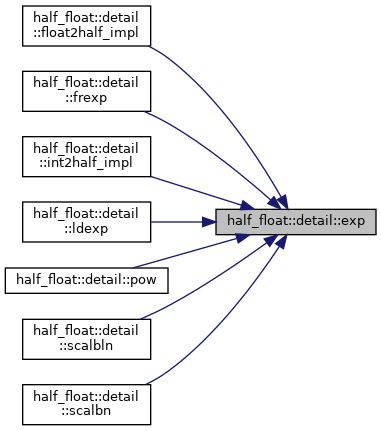
Exponential function.
| arg | function argument |

Exponential minus one.
| arg | function argument |

Exponential function.
| arg | function argument |

Binary exponential.
| arg | function argument |

Exponential function.
| arg | function argument |

Natural logorithm.
| arg | function argument |

Exponential function.
| arg | function argument |

Common logorithm.
| arg | function argument |

Exponential function.
| arg | function argument |

Natural logorithm.
| arg | function argument |

Exponential function.
| arg | function argument |

Binary logorithm.
| arg | function argument |

Exponential function.
| arg | function argument |

Square root.
| arg | function argument |

Square root.
| arg | function argument |

Cubic root.
| arg | function argument |
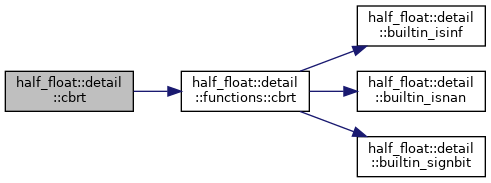
Square root.
| arg | function argument |
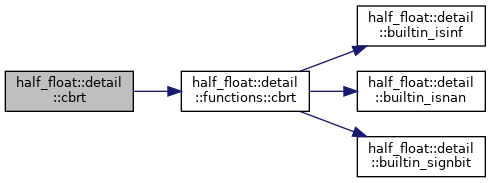
Hypotenuse function.
| x | first argument |
| y | second argument |

Square root.
| arg | function argument |

Square root.
| arg | function argument |

Square root.
| arg | function argument |

Power function.
| base | first argument |
| exp | second argument |

Square root.
| arg | function argument |

Square root.
| arg | function argument |

Square root.
| arg | function argument |

Sine function.
| arg | function argument |

Sine function.
| arg | function argument |

Cosine function.
| arg | function argument |

Sine function.
| arg | function argument |

Tangent function.
| arg | function argument |

Sine function.
| arg | function argument |

Arc sine.
| arg | function argument |

Sine function.
| arg | function argument |

Arc cosine function.
| arg | function argument |

Sine function.
| arg | function argument |

Arc tangent function.
| arg | function argument |

Sine function.
| arg | function argument |

Arc tangent function.
| x | first argument |
| y | second argument |

Sine function.
| arg | function argument |

Sine function.
| arg | function argument |

Sine function.
| arg | function argument |

Hyperbolic sine.
| arg | function argument |

Hyperbolic sine.
| arg | function argument |

Hyperbolic cosine.
| arg | function argument |

Hyperbolic sine.
| arg | function argument |

Hyperbolic tangent.
| arg | function argument |

Hyperbolic sine.
| arg | function argument |

Hyperbolic area sine.
| arg | function argument |

Hyperbolic sine.
| arg | function argument |

Hyperbolic area cosine.
| arg | function argument |

Hyperbolic sine.
| arg | function argument |

Hyperbolic area tangent.
| arg | function argument |

Hyperbolic sine.
| arg | function argument |

Error function.
| arg | function argument |

Error function.
| arg | function argument |

Complementary error function.
| arg | function argument |

Error function.
| arg | function argument |

Natural logarithm of gamma function.
| arg | function argument |

Error function.
| arg | function argument |

Gamma function.
| arg | function argument |

Error function.
| arg | function argument |

Nearest integer not less than half value.
| arg | half to round |

Nearest integer not less than half value.
| arg | half to round |

Nearest integer not greater than half value.
| arg | half to round |

Nearest integer not less than half value.
| arg | half to round |

Nearest integer not greater in magnitude than half value.
| arg | half to round |

Nearest integer not less than half value.
| arg | half to round |

Nearest integer.
| arg | half to round |

Nearest integer not less than half value.
| arg | half to round |

|
inline |
Nearest integer.
| arg | half to round |

|
inline |
Nearest integer not less than half value.
| arg | half to round |

Nearest integer using half's internal rounding mode.
| arg | half expression to round |

Nearest integer not less than half value.
| arg | half to round |

Nearest integer using half's internal rounding mode.
| arg | half expression to round |

Nearest integer not less than half value.
| arg | half to round |

|
inline |
Nearest integer using half's internal rounding mode.
| arg | half expression to round |

|
inline |
Nearest integer not less than half value.
| arg | half to round |

Decompress floating point number.
| arg | number to decompress |
| exp | address to store exponent at |

Decompress floating point number.
| arg | number to decompress |
| exp | address to store exponent at |

Multiply by power of two.
| arg | number to modify |
| exp | power of two to multiply with |

Decompress floating point number.
| arg | number to decompress |
| exp | address to store exponent at |

Extract integer and fractional parts.
| arg | number to decompress |
| iptr | address to store integer part at |

Decompress floating point number.
| arg | number to decompress |
| exp | address to store exponent at |

Multiply by power of two.
| arg | number to modify |
| exp | power of two to multiply with |

Decompress floating point number.
| arg | number to decompress |
| exp | address to store exponent at |

Multiply by power of two.
| arg | number to modify |
| exp | power of two to multiply with |
| arg | number to modify |
| exp | power of two to multiply with |

Decompress floating point number.
| arg | number to decompress |
| exp | address to store exponent at |

Extract exponent.
| arg | number to query |
| FP_ILOGB0 | for zero |
| FP_ILOGBNAN | for NaN |
| MAX_INT | for infinity |

Decompress floating point number.
| arg | number to decompress |
| exp | address to store exponent at |

Extract exponent.
| arg | number to query |

Decompress floating point number.
| arg | number to decompress |
| exp | address to store exponent at |

Next representable value.
| from | value to compute next representable value for |
| to | direction towards which to compute next value |

Decompress floating point number.
| arg | number to decompress |
| exp | address to store exponent at |

Decompress floating point number.
| arg | number to decompress |
| exp | address to store exponent at |

Decompress floating point number.
| arg | number to decompress |
| exp | address to store exponent at |

Next representable value.
| from | value to compute next representable value for |
| to | direction towards which to compute next value |
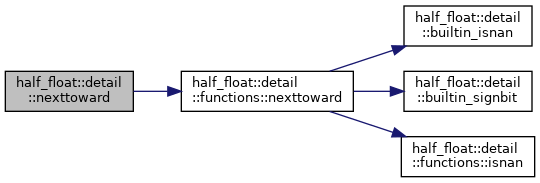
Decompress floating point number.
| arg | number to decompress |
| exp | address to store exponent at |
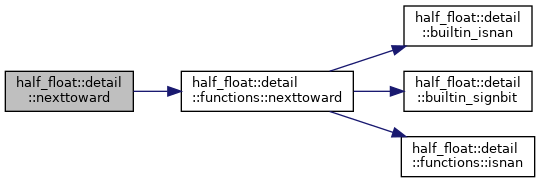
Take sign.
| x | value to change sign for |
| y | value to take sign from |

Decompress floating point number.
| arg | number to decompress |
| exp | address to store exponent at |

Decompress floating point number.
| arg | number to decompress |
| exp | address to store exponent at |

Decompress floating point number.
| arg | number to decompress |
| exp | address to store exponent at |

Classify floating point value.
| arg | number to classify |
| FP_ZERO | for positive and negative zero |
| FP_SUBNORMAL | for subnormal numbers |
| FP_INFINITY | for positive and negative infinity |
| FP_NAN | for NaNs |
| FP_NORMAL | for all other (normal) values |

Classify floating point value.
| arg | number to classify |
| FP_ZERO | for positive and negative zero |
| FP_SUBNORMAL | for subnormal numbers |
| FP_INFINITY | for positive and negative infinity |
| FP_NAN | for NaNs |
| FP_NORMAL | for all other (normal) values |

|
inline |
Check if finite number.
| arg | number to check |
| true | if neither infinity nor NaN |
| false | else |

|
inline |
Classify floating point value.
| arg | number to classify |
| FP_ZERO | for positive and negative zero |
| FP_SUBNORMAL | for subnormal numbers |
| FP_INFINITY | for positive and negative infinity |
| FP_NAN | for NaNs |
| FP_NORMAL | for all other (normal) values |

|
inline |
Check for infinity.
| arg | number to check |
| true | for positive or negative infinity |
| false | else |

|
inline |
Classify floating point value.
| arg | number to classify |
| FP_ZERO | for positive and negative zero |
| FP_SUBNORMAL | for subnormal numbers |
| FP_INFINITY | for positive and negative infinity |
| FP_NAN | for NaNs |
| FP_NORMAL | for all other (normal) values |

|
inline |
Check for NaN.
| arg | number to check |
| true | for NaNs |
| false | else |

|
inline |
Classify floating point value.
| arg | number to classify |
| FP_ZERO | for positive and negative zero |
| FP_SUBNORMAL | for subnormal numbers |
| FP_INFINITY | for positive and negative infinity |
| FP_NAN | for NaNs |
| FP_NORMAL | for all other (normal) values |

|
inline |
Check if normal number.
| arg | number to check |
| true | if normal number |
| false | if either subnormal, zero, infinity or NaN |

|
inline |
Classify floating point value.
| arg | number to classify |
| FP_ZERO | for positive and negative zero |
| FP_SUBNORMAL | for subnormal numbers |
| FP_INFINITY | for positive and negative infinity |
| FP_NAN | for NaNs |
| FP_NORMAL | for all other (normal) values |

|
inline |
Check sign.
| arg | number to check |
| true | for negative number |
| false | for positive number |

|
inline |
Classify floating point value.
| arg | number to classify |
| FP_ZERO | for positive and negative zero |
| FP_SUBNORMAL | for subnormal numbers |
| FP_INFINITY | for positive and negative infinity |
| FP_NAN | for NaNs |
| FP_NORMAL | for all other (normal) values |

Comparison for greater than.
| x | first operand |
| y | second operand |
| true | if x greater than y |
| false | else |

Comparison for greater than.
| x | first operand |
| y | second operand |
| true | if x greater than y |
| false | else |

Comparison for greater than.
| x | first operand |
| y | second operand |
| true | if x greater than y |
| false | else |

Comparison for greater than.
| x | first operand |
| y | second operand |
| true | if x greater than y |
| false | else |

Comparison for greater equal.
| x | first operand |
| y | second operand |
| true | if x greater equal y |
| false | else |

Comparison for greater than.
| x | first operand |
| y | second operand |
| true | if x greater than y |
| false | else |

Comparison for greater than.
| x | first operand |
| y | second operand |
| true | if x greater than y |
| false | else |

Comparison for greater than.
| x | first operand |
| y | second operand |
| true | if x greater than y |
| false | else |

Comparison for less than.
| x | first operand |
| y | second operand |
| true | if x less than y |
| false | else |

Comparison for greater than.
| x | first operand |
| y | second operand |
| true | if x greater than y |
| false | else |

Comparison for greater than.
| x | first operand |
| y | second operand |
| true | if x greater than y |
| false | else |

Comparison for greater than.
| x | first operand |
| y | second operand |
| true | if x greater than y |
| false | else |

Comparison for less equal.
| x | first operand |
| y | second operand |
| true | if x less equal y |
| false | else |

Comparison for greater than.
| x | first operand |
| y | second operand |
| true | if x greater than y |
| false | else |

Comparison for greater than.
| x | first operand |
| y | second operand |
| true | if x greater than y |
| false | else |

Comparison for greater than.
| x | first operand |
| y | second operand |
| true | if x greater than y |
| false | else |

Comarison for less or greater.
| x | first operand |
| y | second operand |
| true | if either less or greater |
| false | else |

Comparison for greater than.
| x | first operand |
| y | second operand |
| true | if x greater than y |
| false | else |

Comparison for greater than.
| x | first operand |
| y | second operand |
| true | if x greater than y |
| false | else |

Comparison for greater than.
| x | first operand |
| y | second operand |
| true | if x greater than y |
| false | else |

Check if unordered.
| x | first operand |
| y | second operand |
| true | if unordered (one or two NaN operands) |
| false | else |

Comparison for greater than.
| x | first operand |
| y | second operand |
| true | if x greater than y |
| false | else |

Comparison for greater than.
| x | first operand |
| y | second operand |
| true | if x greater than y |
| false | else |

Comparison for greater than.
| x | first operand |
| y | second operand |
| true | if x greater than y |
| false | else |

| T half_float::detail::half_cast | ( | U | arg | ) |
Cast to or from half-precision floating point number.
This casts between half and any built-in arithmetic type. The values are converted directly using the given rounding mode, without any roundtrip over float that a static_cast would otherwise do. It uses the default rounding mode.
Using this cast with neither of the two types being a half or with any of the two types not being a built-in arithmetic type (apart from half, of course) results in a compiler error and casting between halfs is just a no-op.
| T | destination type (half or built-in arithmetic type) |
| U | source type (half or built-in arithmetic type) |
| arg | value to cast |
| T half_float::detail::half_cast | ( | U | arg | ) |
Cast to or from half-precision floating point number.
This casts between half and any built-in arithmetic type. The values are converted directly using the given rounding mode, without any roundtrip over float that a static_cast would otherwise do.
Using this cast with neither of the two types being a half or with any of the two types not being a built-in arithmetic type (apart from half, of course) results in a compiler error and casting between halfs is just a no-op.
| T | destination type (half or built-in arithmetic type) |
| R | rounding mode to use. |
| U | source type (half or built-in arithmetic type) |
| arg | value to cast |
| uint16 half_float::detail::float2half_impl | ( | T | value, |
| ... | |||
| ) |
Convert non-IEEE floating point to half-precision.
| R | rounding mode to use, std::round_indeterminate for fastest rounding |
| T | source type (builtin floating point type) |
| value | floating point value |
